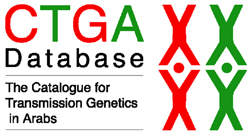Sheikh Hamdan Bin Rashid Al Maktoum Award for Medical Sciences celebrates 7th anniversary of the CTGA Database CTGA Database includes records for 991 Genetic Disorders, mostly inherited A million visitor to CTGA database online
14 December 2011
Sheikh Hamdan Bin Rashid Al Maktoum Award for Medical Sciences celebrates 7th anniversary of the CTGA Database
CTGA Database includes records for 991 Genetic Disorders, mostly inherited
A million visitor to CTGA database online
Sheikh Hamdan Bin Rashid Al Maktoum Award for Medical Sciences (SHAMS) celebrated the 7th anniversary of the establishment of the Catalogue for Transmission Genetics in Arabs (CTGA) Database.
CTGA Database, which was launched online on the 30th of November 2004 by SHAMS’ Centre for Arab Genomic Studies, is considered the largest Ethnic-Specific Database worldwide. The Database plays a vital role in shaping a clear map of Genetic Disorders in Arabs, and provides information to researchers, doctors and policy makers helping them in putting future plans aiming at developing Arab health care institutions and in diagnosis and treatment of many patients.
Prof. Najib Al Khaja, Secretary General of SHAMS and President of the Centre for Arab Genomic Studies, added that during seven years of continuous work, the CTGA Database draws its content primarily from nearly 2800 independent studies on Arab patients through a systematic survey of eight thousand regional and international peer-reviewed medical journals.
The publicly free database includes information on Genetic Disorders in 23 Arab countries including United Arab Emirates, Saudi Arabia, Qatar, Bahrain, Oman, Kuwait, Yemen, Iraq, Syria, Jordan, Lebanon, Palestine, Egypt, Libya, Tunisia, Morocco, Algeria, Sudan, Mauritania, Djibouti, Eritrea, Comoros, and Somalia.
Prof. Al Khaja said that although the language used in the database is English, Sheikh Hamdan Bin Rashid Al Maktoum Award for Medical Sciences has realized the importance of benefitting from the database in promoting the awareness among Arabs regarding to the seriousness of Genetic Disorders and reducing the spread of inherited diseases.
"With the aim of achieving such goal, SHAMS has issued "Genetics Made Easy", which is a series of books including information from the CTGA Database and written in simple English and Arabic languages for non-specialists. Two issues of these books have been already published focusing on Cancers and Blood Disorders, and we do hope to publish new issues in the future", Prof. Al Khaja said.
According to recent statistics by CAGS, the CTGA Database served 965,121 unique visitors, mostly from West Asia, North Europe, North America and North Africa.
Dr. Mahmoud Taleb Al Ali, Director of Centre for Arab Genomic Studies said that regarding to the database, the number of Genetic Disorders in Arabs has reached to 991 disorders, 34% of which include ‘Congenital Malformations & Chromosomal Abnormalities. This type is followed by ‘Metabolic Disorders’ (19%), ‘Nervous System Disorders’ (11%), and ‘Disorders of the Blood & the Immune Mechanism’ (6%). The database provides information on clinical aspects of these disorders, such as their characteristics, diagnosis and treatment.
"Genetic Disorders with well-established record in the Database are Sickle Cell Anemia, Beta-Thalassemia, Diabetes Mellitus Non-Insulin Dependent, Glucose-6-Phosphate Dehydrogenase Deficiency, and Down Syndrome. 61% of Genetic Disorders in Arabs are inherited", Dr. Mahmoud Taleb Al Ali said. "The CTGA Database is also home for the Arab Variome Data, which includes a large mutation collection from 400 genes", Dr. Al Ali said.
"The database includes data about some common Genetic Disorders that have been monitored in several studies conducted on Arab patients such as Parkinson, Thalassemia, Cancers, and Deafness", he added.
Dr Mahmoud Taleb said that Extensive surveys were complete for UAE in 2005, Bahrain in 2006, Oman in 2008, and Qatar in 2010. A survey to collect data from Kuwait is currently underway and is expected to be completed in the Late 2012.
He added that the database published data on Genetic Disorders in Saudi Arabia, Egypt, Tunisia, Lebanon, Iraq, and Palestine, and extensive surveys will be completed in each of these countries.

